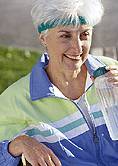
FRIDAY, Dec. 11 (HealthDay News) — Blood levels of LDL cholesterol, the bad kind that blocks arteries, go up sharply in women at the time of menopause, but there are no other dramatic changes in risk factors for heart attack, stroke and other cardiovascular problems, a new study has found.
“This suggests that as women approach menopause, they need to have their lipid profiles checked,” said Karen A. Matthews, a professor of psychiatry, epidemiology and psychology at the University of Pittsburgh and the study’s lead author. A report on the findings is published in the Dec. 15/22 issue of the Journal of the American College of Cardiology, which is focused on prevention of cardiovascular disease.
Two other studies reported in the same issue showed that higher doses of statins, drugs that lower LDL cholesterol levels, are more effective over the long run than lower doses in preventing heart attacks, other cardiovascular problems and premature death.
The menopause report is the latest from a study that has followed more than 3,000 American women since 1996, “trying to understand the changes women experience during life,” Matthews said. One major change is menopause, when menstruation stops as production of estrogen is reduced.
It has been known that women’s risk for cardiovascular problems increases after menopause. “Our study has been checking many different things in relation to menopause and cardiovascular risk,” Matthews said. “The primary result is an increase in total cholesterol, due to an increase in LDL cholesterol as well as in apolipoprotein B, the protein carrier for LDL cholesterol.”
Those changes occur regardless of ethnic background and “appear to be a fairly uniform response to menopause,” she said.
“Other risk factors we measured didn’t show a dramatic change,” Matthews said. “I expected to see some change in inflammatory factors because some data suggest that hormone users have higher cholesterol levels, but it did not occur.”
The lesson she draws from the finding is that women should pay more attention to lifestyle factors associated with cardiovascular risk as menopause approaches and occurs. “They should lose weight and keep it off and increase their physical activity,” Matthews said. “Smokers should stop smoking.”
The study will continue to chart the changes that occur after menopause, she said, looking at such problems as “what happens if you have a lot of hot flashes.”
The two statin studies, sponsored by Pfizer and Bristol-Myers Squibb, which market versions of the cholesterol-lowering drugs, looked at the effects of different dosages, comparing 80 milligrams a day with 40 milligrams daily in nearly 14,000 patients who had experienced one heart attack or other cardiovascular event.
It’s been customary to give a higher statin dose after such an event, and the question has been whether to switch back to the lower dose after a while, said Dr. Christopher P. Cannon, a cardiologist at Brigham and Women’s Hospital in Boston and a member of the team that performed one of the studies.
“The short answer is that the use of strong statins is helpful in preventing not just a first heart attack or death but could prevent more problems than just one,” Cannon said.
That answer emerged because the researchers changed the way they had been counting. In previous studies, they stopped assessing the effect of higher-dose statin use after a single second event. In the two new studies, they kept monitoring the effects after a second event.
“The benefits are even bigger than we thought,” Cannon said. “Fifty percent more events were prevented than we have been counting to date because we were just counting the first event.”
Other studies in the same issue of the journal reported that:
- People who stopped smoking after a first heart attack had half the risk of dying prematurely than did those who continued to smoke.
- High blood pressure and atherosclerosis, or hardening of the arteries, develop before puberty in obese children, and increased physical activity decreases them.
- Modest weight loss in obese adults, an average of 22 pounds, improves heart muscle and blood vessel structure and function.
More information
The American Heart Association has more on good and bad cholesterol.

